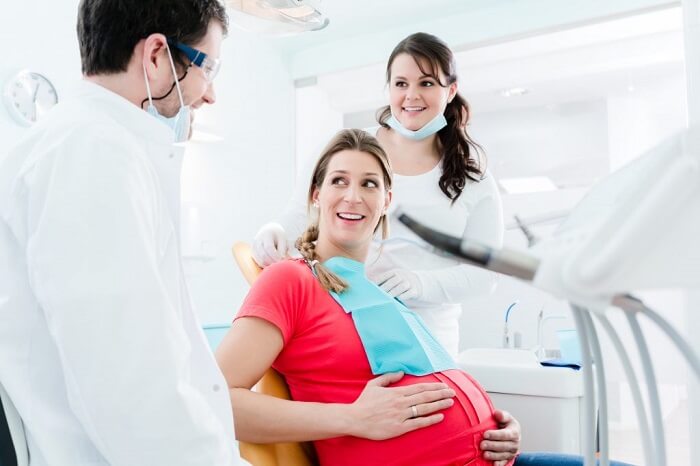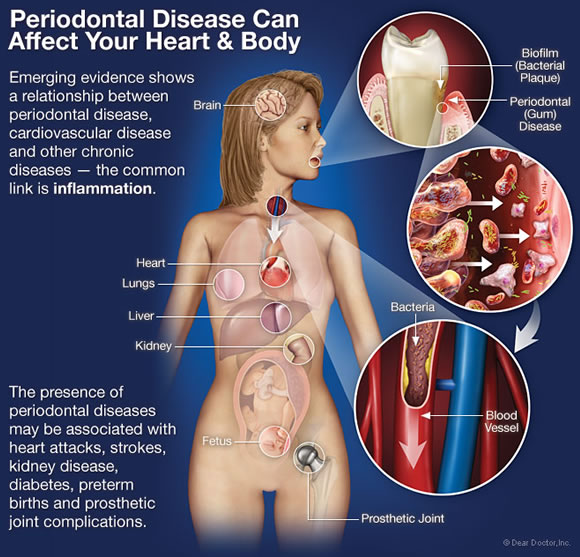Pregnancy is a cause of concern for any kind of medical treatment. Some procedures and medication may carry risks for the child. What about going to the dentist? Is it safe to have dental work done while pregnant? The general answer is yes. Dental work during pregnancy is not only possible, but also advisable.
Below, we will look at some particular situations related to dental work during pregnancy. We will also address a number of questions pregnant women might ask themselves before visiting the dentist.
Oral Health and Pregnancy – Key Points to Make
Pregnant women should give the utmost importance to their health. Oral health is not an exception from this rule. Below, we have prepared a list of key points and tips relating to dentistry while pregnant.
Is it safe to go to the dentist while pregnant?
Yes, it is. Routine checks are recommended, as they can reveal problems which might affect the health of both mother and child. In addition, a routine check can also detect some specific oral conditions (i.e. pregnancy gum inflammation) which are best tackled early on by your doctors. Remember to tell your dentist everything about the medication you might be taking, and about the specifics of your pregnancy.
Swollen gums during pregnancy
Some women develop gum inflammation during pregnancy. This is a consequence of the chemical and hormonal changes. Do not ignore the symptoms (painful, swollen, red gums). Visit your dentist as soon as possible. Left untreated, gingivitis can have serious complications, such as periodontitis. A more immediate consequence could be a serious infection in the oral cavity, which will negatively influence the overall health, and is detrimental to the pregnancy.
Diet during pregnancy
When pregnant, many women feel the urge to eat more. However, this can lead to tooth decay, which is more likely during pregnancy anyway due to chemical and hormonal changes. A healthy diet, rich in vitamins and healthy nutrients (raw vegetables, varied dairy products, lean meat) is recommended. Avoid diets rich in sugars, and do not forget to brush and floss twice a day.
Recommended read: Essential Minerals and Vitamins for Pregnant Women
Can you take dental x rays while pregnant?
Morning sickness and dental health
Vomiting can expose your teeth to potent stomach acids, which have an extremely negative effect on oral chemistry and encourage tooth decay. Should you suffer from morning sickness, ask your dentist to prescribe you a special alkaline mouthwash to protect your teeth from acid exposure.
Oral hygiene during pregnancy
Poor oral hygiene can lead to serious pregnancy problems, which can affect the health of the baby. Poor development and premature birth, for instance, are not unconnected to poor hygiene standards, oral hygiene included. Thus, remember to brush gently after each meal, floss twice a day and avoid food known to encourage tooth decay, such as soda drinks, sugar-rich foods, junk food etc. Ask your doctor for advice as to what exactly you should eat during pregnancy.
Medication during pregnancy
Most types of medication have side-effects, some of which can be damaging to you and the child. As such, always consult both your dentist and your doctor before using medication prior, during, or after dental work while pregnant. Also, when using toothpaste, mouthwash, and other oral care products, make sure they are all approved by ADA (the American Dental Association). This will be mentioned on the packaging.
Dental anesthesia during pregnancy
While local anesthetics do not normally pose any problems to pregnant patients, there is always a risk associated with unknown allergies, and other medical conditions. Though the risk is very low, ideally the body should be exposed to as little disruptive substances as possible during pregnancy.
Avoid dental work while pregnant in the first semester
During the first semester of pregnancy, the fetus is the most vulnerable because internal organs are not yet developed. Avoid any disruptive activities in this period as much as possible. Dental treatment in the second semester would pose fewer risks.
Emergency Dental Work While Pregnant – Assessing the Risks
Future mothers tend to refrain from going to the dentist unless it’s an emergency. While ceasing to seek dental treatment during pregnancy might seem wise, there are some conditions which should not suffer postponement. Below, we’ve underlined some of these for you.
Impacted wisdom teeth removal during pregnancy
Impacted wisdom teeth are a major nuisance at any moment. During pregnancy they can become an even more serious problem. Surgery might involve the use of general anesthesia, which might affect your pregnancy in some specific situations. Make sure you talk to both your dentist and your doctor before removing wisdom teeth while you are pregnant.
Severe Cavities/Tooth Decay
Dental decay can determine the inevitability of dental work while pregnant, especially in the case of advanced cavities. These can penetrate the enamel and reach the pulp, or the inside of the tooth. Nerves present in the pulp can cause severe pain. Pain, in general, is not a good thing to have during pregnancy, as the child is also affected by the mother’s distress. As such, cavities should be treated before they reach the nerve, and ideally before pregnancy. Tooth filling or root canal procedures done while pregnant should be performed by your dentist only after ensuring that any and all treatment applied does not pose a risk for the baby’s health.
Severe Plaque
It is important that plaque is removed before or during pregnancy, because it is the main trigger for gum disease, infection, and inflammation. It is very important to note that gums become sensitive during pregnancy, regardless of whether gum disease or plaque were present or not. Thus, if plaque is already present, there is a risk of developing a serious form of gingivitis during pregnancy. Your dentist can clean plaque by using a simple procedure which does not normally pose any risk to the baby or to the mother.
Should You Consider Other Dental Procedures During Pregnancy?
A common mistake people make is to undertake unnecessary cosmetic procedures, which are neither advisable nor necessary during pregnancy.
Veneers, for instance, might cause gum inflammation, which might occur during pregnancy. Tooth whitening causes exposure to a number of chemicals which may cause allergic reactions that are not desirable during pregnancy.
In general, pregnant women should postpone any exposure to substances or procedures which would cause significant changes to the oral environment until after birth. Always consult your doctor and dentist before attempting any such procedure.
Conclusions
The best way to avoid dental problems during pregnancy is to exercise prevention and avoid exposing your body to unnecessary risks. If dental work while pregnant is necessary, make sure that you consult both your doctor and your dentist before undergoing any procedures. Avoid any complex dental procedures if possible. In addition, maintain oral hygiene and keep a healthy diet.
We may conclude by stating that dental work while pregnant is possible, but must occur by keeping track of an important number of factors and precautions.



Leave a Comment